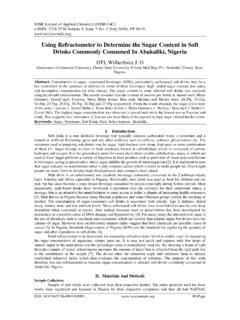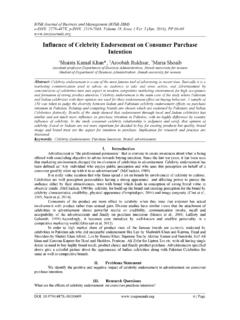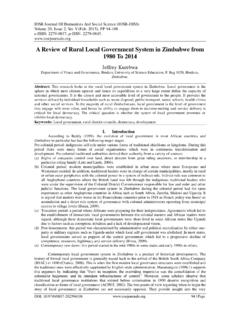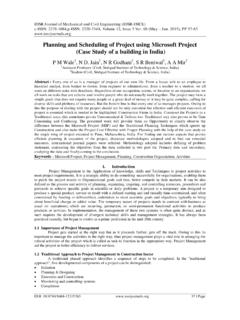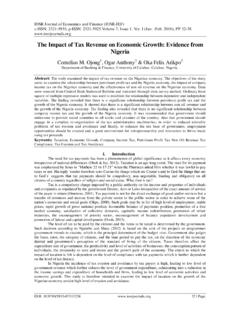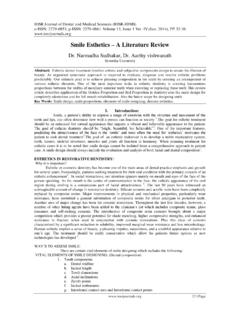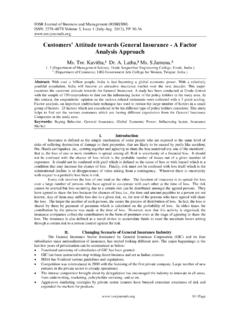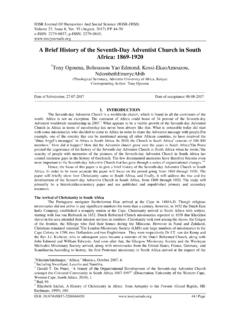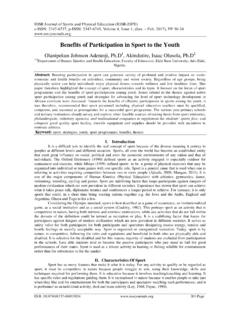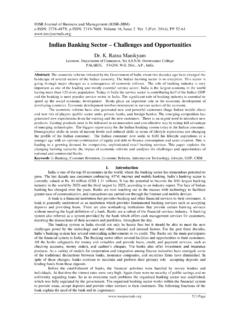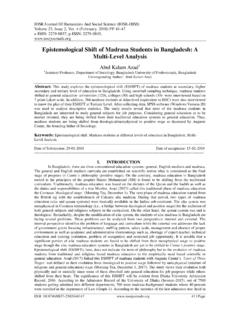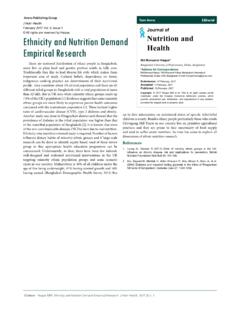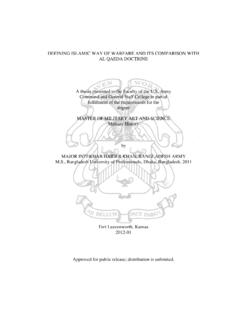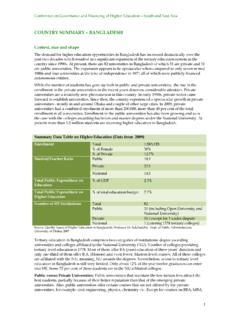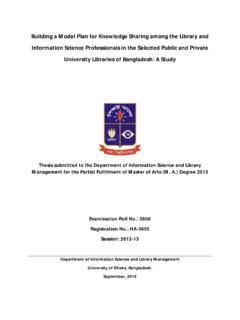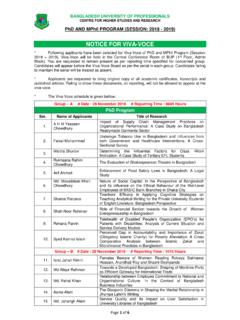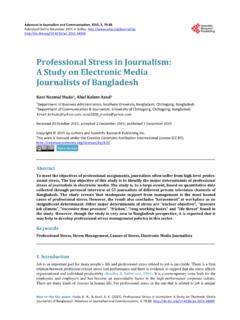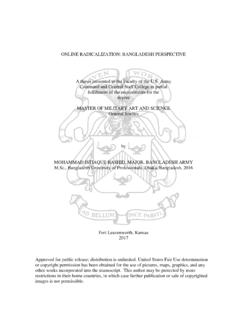Transcription of The Impact of Demographic Factors on the Decisions of ...
1 IOSR Journal of Business and Management (IOSR-JBM) e-ISSN: 2278-487X, p-ISSN: 2319-7668. Volume 19, Issue 8. Ver. IV. (August 2017), PP 01-07 DOI: 1 | Page The Impact of Demographic Factors on the Decisions of Investors during Dividend Declaration: A Study on Dhaka Stock Exchange, bangladesh Zobaida Khanam* Lecturer, Department of Accounting & Information Systems, bangladesh university of Professionals, Dhaka- bangladesh Corresponding Author: Zobaida Khanam Abstract: Stock investment Decisions are influenced by different Factors when certain information prevails in the capital market.
2 Demographic Factors are considered as one of the Decisions influencing factor among others. This study examines the association between certain Demographic Factors and Decisions of the investors particularly when different companies announce dividend on their stocks. In this paper, the empirical analysis is conducted in two stages. First, the Demographic Factors such as age, education level, occupation, experience and income level of investors are evaluated individually and then the Decisions of the general investors of buying, selling and holding stock during dividend declaration has been identified through a structured questionnaire.
3 Questionnaires are distributed to a random sample of 300 general investors of Dhaka Stock Exchange, bangladesh . Using Chi-square test, it is illustrated that having same dividend declaration information, different investors response differently and significant relationship exists between Demographic Factors and investment Decisions of the have been found between the results of this study with the results of previous studies of other countries. This study, hopefully, will help the stock market of bangladesh to be aware of the responses of investors with different Demographic profile during dividend declaration.
4 Keywords: dividend, Demographic Factors , investors Decisions , stock market, stock exchange. ---------------------------------------- ---------------------------------------- ---------------------------------------- --------------- Date of Submission: 31-07-2017 Date of acceptance: 17-08-2017 ---------------------------------------- ---------------------------------------- ---------------------------------------- --------------- I. Introduction In bangladesh , the secondary market especially the stock market is very much attractive to the investors due to its liquidity and the inherent return possibility for the volatility of the market.
5 Stock market can play a significant role in capital formation and allocation by providing a platform for investment opportunities. The smooth performance of a capital market mostly depends on the investors investment behaviour or investment Decisions under various capital market information. For ages, it has presumed that investors have taken into consideration of all the necessary market information available while taking Decisions for investment and are impartial in analysing securities and choosing the high-yield stocks. But in several types of research around the world demonstrated that investors investment Decisions that influence their trading volume and contribute stock price volatility are not taken based on available information.
6 (Ahmed, Ullah, & Tanzia, 2014)[1]in his study on bangladesh stock market found that there is no significant relationship between average price, earnings per share, price -earnings ratio and activity and turnover of the stock information with stock-price variability. In their study, they stated that high level of price variability of Bangladeshi stocks is unpredictable and cannot be explained through known market Factors . However, in many studies, it was found that stock price movement is positively related with trading volume (Clark, 1973; Crouch, 1970; Morgan, 1976)[2,3,4]. (Babajide & Adetiloye, 2012)[5]stated that investors are not as rational as they are supposed to be.
7 This divergence explained through the new concept of finance which is called behavioural finance that describes why investors make irrational Decisions (Olsen, 1998)[6]in his article projected the relation between behavioural finance and stock-price volatility. He found that if all the investors were given the same set of data then also the differences in data perception would prevail. Different researchers present a different number of Factors that affect the decision-making process of investors in the stock market.(Bakar & Yi, 2016)[7]investigated psychological Factors , such as the overconfidence bias, conservatism bias, herding and availability bias possible Impact on financial Decisions .
8 (Das & Jain, 2014)[8] identified Demographic Factors of investors that make an Impact on investment Decisions . Numerous studies from other countries (Jain & Mandot, 2012; Kliber, L t, & The Impact of Demographic Factors on the Decisions of Investors during Dividend Declaration DOI: 2 | Page Rutkowska, 2016; Mwaka, 2013; Ton & Nguyen, 2014)[9,10,11,12] have established that investors Demographic Factors do have an Impact on the investment Decisions towards various capital market information. As in bangladesh , a total of 3 million retail investors accounts are active in both Dhaka and Chittagong Stock Exchange(Annual report of bangladesh Security and Exchange Commission (BSEC), 2014)[13]and the capital markets are now more concerned about increasing the participation of individual investors in the stock market through offering attractive return possibilities.
9 In this regard, an understanding of investors Decisions particularly when companies announce dividend return will be of great significance to explain whether the responses or Decisions of the investors to buy, sell or hold a stock during dividend declaration vary according to their different Demographic background. Keeping the importance in mind, this paper seeks to evaluate the Decisions of investors during dividend declaration considering investors Demographic profile. For this empirical study an organized questionnaire study is conducted on a sample group of shareholders purposively selected from Dhaka stock exchange, bangladesh and then applying the selected statistical methods, it is cautiously examined whether the demographical Factors of investors such as age, education level, occupation, experience and income level are influential on their investment Decisions of buying, selling and holding of shares during dividend declaration by listed companies.
10 The remaining part of this paper is organized as follows. In Section , relevant literature is reviewed conducted to scrutinize the Demographic Factors of investors focusing on their responses and the relevant hypothesis has been developed. In section methodology is presented and findings of the study are discussed in section Conclusion is presented in section followed by references. II. Literature Review And Hypothesis Development Traditional models are based on the assumption that market participants always behave in a rational and self-bettering, or wealth-maximizing manner. But investors sometimes tend to behave irrationally without any deep thought of their own which is liable for stock market inconsistent output such as sudden severe rises or falls in stock price.
